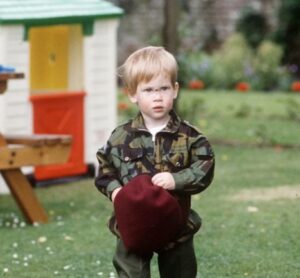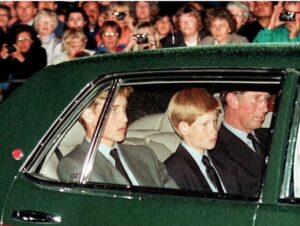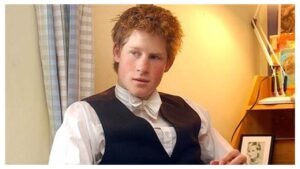“You were raised in deprivation.”

That’s what Dr. Gabor Mate told Prince Harry he experienced, despite his material privilege. Just prior to this, Harry had been insisting that his childhood was overall a good one, but stopped when he saw the Dr. shaking his head. This moment happened during the early minutes of the conversation between the two on March 4, and it seemed to really take the Prince a bit back.
Dr. Mate explains that while Harry may have had privilege and wealth, he had very little else that a child needs. There was a lack of affection from his father who was emotionally distant. His parents had bitter conflict and infidelity, which he witnessed. He then gave a rundown of major and minor traumas children can experience, and Harry agreed that he experienced them all. He has a very high ACE (Adverse Childhood Experiences) score.
Yet, Harry said, he’s not any more traumatized than most people. “Aren’t we all?” he asked.
So Much For “Whining”
Honestly, I’m beyond fed up with the people who label Harry’s book and the interviews surrounding it as “whining.” The man has clearly suffered emotional abuse at the hands of his family and the royal system. Calling attention to mistreatment, saying “this happened to me and it’s wrong,” is – and I thought we’d all understood this by now – brave and necessary. But the truth is, Harry has said nothing in either circumstance that is whiny in the slightest. He doesn’t think he had it worse than anyone else. On the contrary, he’s a lot more conciliatory and understanding toward his dad than I am toward mine.

Of course, I’ve been No Contact with mine a bit longer than he has.
Either way, Harry actually sets a tone of acknowledging his wealth and privilege, owning up to the mistakes he’s made, and yet saying “this is what also was done to me. It was wrong. This is what I’ve done about it. Now you understand why I’ve made the choices I’ve made.”
Never once does he ask for pity. He just wants to tell his side. Most of us who’ve dealt with abusive family understand how they twist the story to make us out to be the villain, and how that feels like yet another arrow in the back. How liberating it feels to get our side of the story out there.
Surely Harry, whose abuse played out on an international stage, deserves the same freedom.
Abusers Won’t Allow Authenticity
One of the things Harry discussed was that growing up he often felt that he was physically present with his family, but mentally somewhere else, or vice versa. He says he never felt like he was able to be himself, and that when he did members of his family would tell him not to act that way, or otherwise shut him down. Eventually this led to such a disconnect that he really didn’t know WHO he was, and that he was on a journey to figure that out.

Abusers HATE authenticity. Harry’s family shit on him for being authentic – so did mine. I remember how my parents would outright laugh at me, call me “ridiculous,” or mock me when I was trying to figure out how I wanted to dress as a preteen, or wear my hair, or when I first started learning to wear makeup. My mannerisms, my taste in music, my opinions – they scrutinized and critiqued and condemned them all. I eventually created an entire fantasy world I escaped to right under everyone’s noses.
Dr. Mate said that abusers want the picture that they want, the one that makes THEM look good, not your real. They want to see a mirror that they want to see, but if you hold up an authentic mirror, it doesn’t give them what they want, so they try to crush that image. They resist your real because it makes them uncomfortable. But when a child isn’t validated for who they are, and allowed to feel and experience their emotions, they lose their sense of self. That’s what happened to Harry – and to a lot of us.
Independence Enrages The Abuser
The abuser becomes invested in us remaining in the mold they’ve created for us because it reinforces their image of themselves. So when we begin to break out of it, it enrages them. (They become “incandescent” even). The more independent we get, the angrier they become.
Which is exactly what played out in my life, and is exactly what has played out with Harry’s abusers in the British press. Sadly, Harry also said that the healthier he became after starting therapy, the further he felt separated from his family. It was as if they were speaking two different languages. They weren’t willing to see the toxic patterns and cycles they’re caught up in, much less do any work to change them.
Dr. Mate said that there comes a time where we have to decide: Am I going to be ME, or am I going to be liked and accepted by these people? We can’t have both. The abuser won’t allow it. Not everyone can, or wants to, chose authenticity and lose the support and acceptance of those around them. We have to have understanding for people trapped in a charade out of survival. Prince Harry says that he’s lost a lot for the stand he’s taken – but he’s gained a lot as well.
When we do find the strength and the circumstances, we often see that freedom is worth the cost.
The People Who Accepted Harry As “Wild”

In Spare. Harry introduces us to “Mike and Teej,” AKA Mike Holding and Tania Jenkins of Botswana. They run AfriScreen, the award-winning documentary production company that produced BBC’s Planet Earth series. He began visiting the country as a teen, and it was literally life changing. He describes Mike and Teej as the first people to actually see him for who he was. Dr. Mate asks how it felt to be “naturally accepted as ‘wild.'”
“It felt wonderful,” Harry responded, “when people finally SAW me and gave me space. But then flying back to London was always the ‘snap out of it’ moment.”
Everyone needs at least one person that sees you for who you really are. First, you connect with that wild, authentic person deep inside you that the abusers rejected. Then others begin to see and validate that authentic person.
The more that happens, the more you heal.
Triggers Serve a Purpose In Healing Trauma
This section really blew my mind. After Dr. Mate ran through a list of diagnoses he’d picked up from reading Spare – which he told Harry to do with what he would, they were just from reading a book, not formal – Harry wanted to know: Is there an age limit on healing from trauma? A cut off? Are we ever too old?
Dr. Mate replied that no, we are never too old to heal. But, that healing starts with acknowledgment, which is often blocked by fear. We fear triggers because they are painful, but they bring our attention to what we must acknowledge and heal from.
And not gonna lie, my head exploded a little bit there. So let me say it again. We have to acknowledge the trauma to heal it. We often have suppressed the memory until something triggers us. Naturally we fear the trigger because it’s painful, but triggers bring our attention to what we must acknowledge and heal from.
Damn.
When I first moved back to my hometown – something I’d wanted to do for 39 years – I was shocked to discover an avalanche of triggers. Memories around every corner. And at first it was super upsetting, that after all this time I’d finally realized my dream only for it to kick me in the teeth. But over time I processed more and more of those memories, and now I’m in a much better place. It was a difficult process, but absolutely worth it.
These are the main highlights from Harry’s interview – I don’t know if it will ever be released for the general public, but if it is, I highly recommend watching it, no matter your opinions on Harry. I also asked my therapist, and she wholeheartedly stands behind Dr. Mate’s book, so I’m putting it on my list and suggest that you do as well.
